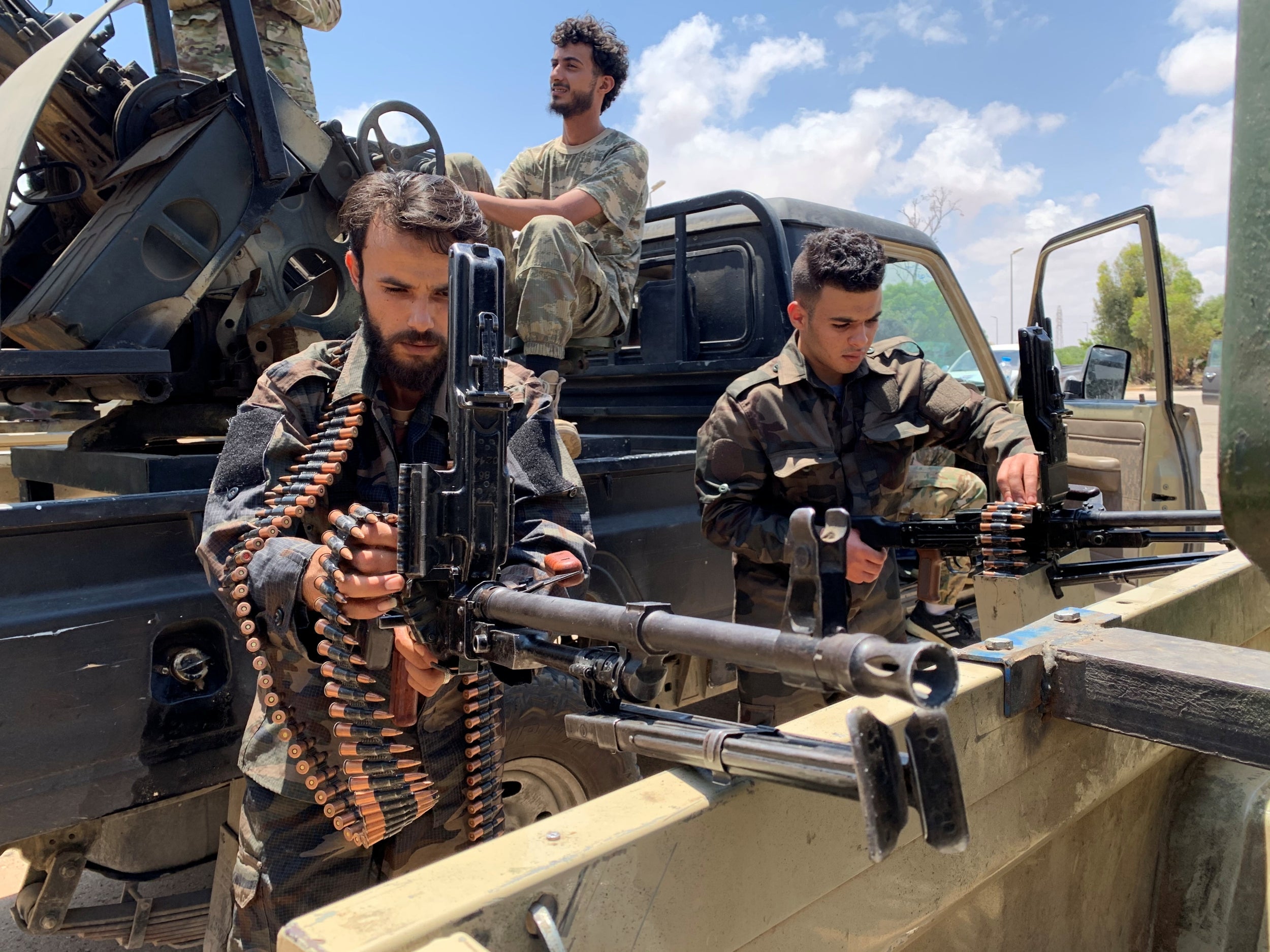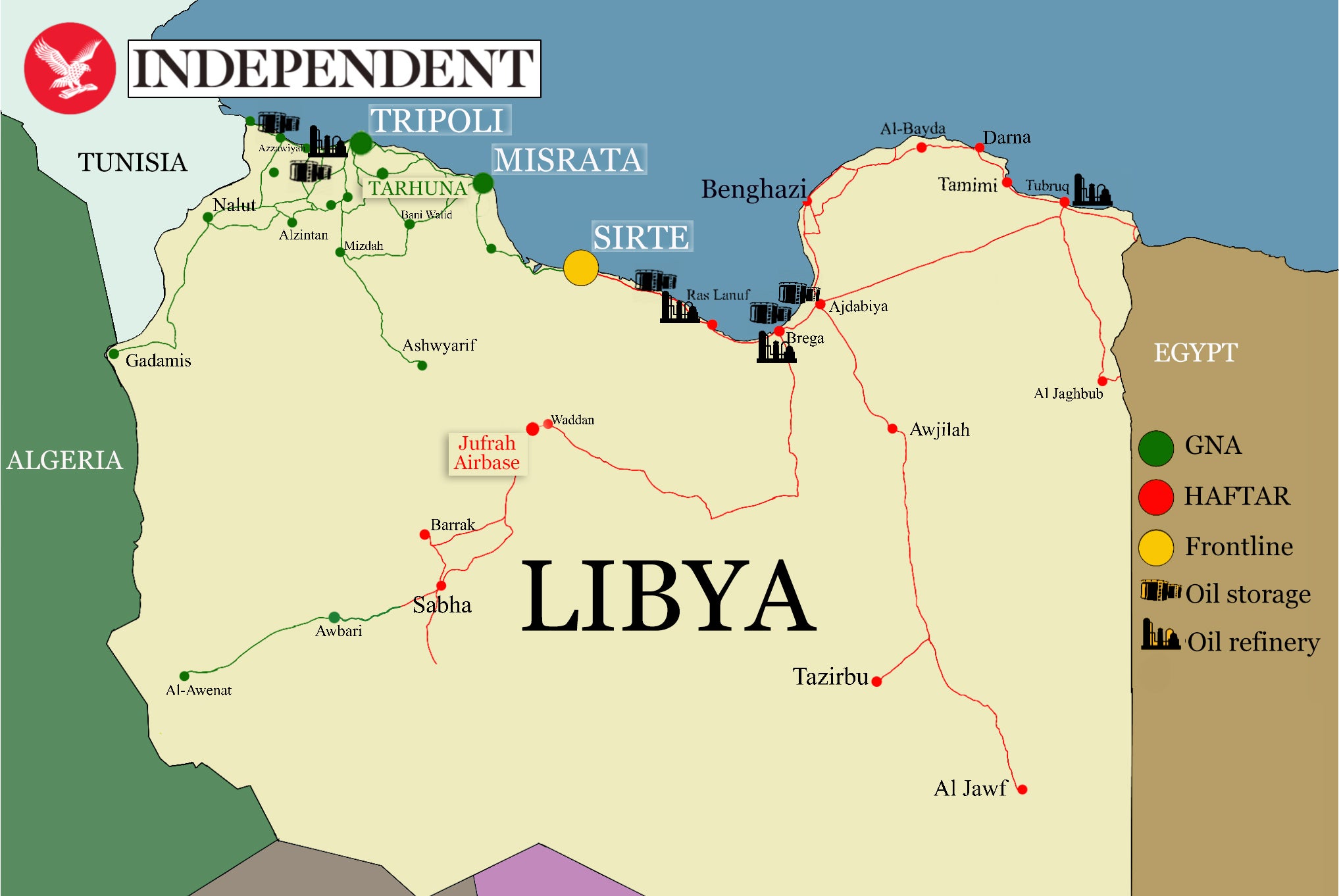Turkey’s illicit arms deliveries to Libya are more brazen than ever, yet Nato continues to ‘turn a blind eye’
No country has flouted the nine-year UN arms embargo on Libya as openly as Turkey, writes Borzou Daragahi


Never much of a secret, the flow of Turkish weapons into Libya has become increasingly open. Last year, Turkey went so far as to employ a local company specialising in the international transport of fruits and vegetables to quietly and surreptitiously move weapons, including armoured vehicles and surveillance drones, to forces loyal to the internationally recognised government in Libya.
But this year, arms shipments to Ankara’s allies in Libya are being moved on ships with Turkish military personnel aboard and escorted by Turkish warships, present to fend off any potential interlopers, according to research conducted by a French open-source intelligence organisation.
The alleged violations by Turkey of a United Nations arms embargo have raised some concerns in the international community, especially from France, which has zeroed in on Ankara’s shipments to Libya as a source of instability in the North African country.
“We expect more from an ally, no question,” said a senior French official who spoke on condition of anonymity. “We have a security guarantee with Turkey, and yes, we take it seriously.”
The United Arab Emirates and Egypt are also funnelling weapons to Libya, and Russia has deployed fighter jets and Kremlin-linked mercenaries to the large oil-rich north African country, as documented by UN investigators. Along with France, all support renegade warlord Khalifa Haftar, who has waged a years-long armed campaign to take total control of the country.
“The embargo is violated every day from the Egyptian border ... and every day there are flights from the UAE to Libya,” Turkey’s ambassador to France, Ismail Hakki Musa, said late last month in a meeting with French lawmakers. “Why are questions not being asked?”
Without singling out Turkey or any other country, the UK’s James Cleverly, minister of state for Middle East and north Africa, on Wednesday called on all parties to “refrain from activities exacerbating the conflict, including the financing of military capabilities and the recruitment of mercenaries”. He said it was a violation of commitments made by a number of countries at a Libya peace conference in Berlin earlier this year.
“It is clear, sadly, that some of those same countries have continued to arm and supply their proxies in flagrant violation of the arms embargo,” he said in a statement to the UN Security Council.
No country has flouted the nine-year UN arms embargo on Libya as openly as Turkey, whose parliament this year authorised military assistance to the Government of National Accord (GNA).
According to Libya: Turkey’s Shadow Arms Deliveries, a report by the Paris-based open-source intelligence collective OpenFacto, Turkey has transported weapons to forces loyal to the UN-recognised GNA in Libya using elaborate means of cloaking the shipments.
Turkey has used foreign shipping lines, working with known arms traffickers, to send the weapons, using circuitous routes to avoid European waters. They have also employed a variety of methods to fool trackers, including changing the appearance of the boats, according to the report, which examines open-source material including ship-tracking data, public documents, and even selfies by fighters posing with newly arrived weapons.

“They didn’t even try to hide them at a certain point,” said one of the researchers on the project in a telephone interview. “They had Turkish soldiers on board, accompanying the arms. It was not like smugglers. They do it openly. They do it during the daylight. It is sort of perfectly known.”
Sometimes the ships turn off their trackers, as a tactic to deter or fool foreign navies attempting to interdict weapons in real time instead of hiding the ships’ origins or destinations.
UN Security Council Resolution 1970, passed in 2011 amid an armed, western-backed uprising against the Libyan regime of Muammar Gaddafi, calls on all member states “to prevent the direct or indirect supply, sale or transfer” to Libya of any arms, “including weapons and ammunition, military vehicles and equipment, paramilitary equipment, and spare parts”, as well as technical or financial military support. It specifically bars “the provision of armed mercenary personnel”.
France has repeatedly sought to deter the Turkish arms shipments, apparently acting at the behest of the UAE, the oil-rich monarchy that purchases French war planes and has an ally in the French foreign minister Jean-Yves Le Drian.
On 23 March, a ship called the MV Pray, which had recently been renamed after arriving in Turkey, was 180 nautical miles off the coast of Libya when it was confronted by a French frigate and heading back to the Turkish coast, escorted by two Turkish warships, according to the OpenFacto report.
But Turkey now regularly dispatches military frigates to escort its shipments and deter possible attacks as it builds up it and its Libyan allies’ military capabilities.
In a 10 June incident, a French warship sought to inspect a Tanzanian-flagged ship heading to Libya, but was prevented by Turkish warships accompanying it.
The military shipments – including armoured vehicles, sophisticated surveillance and combat drones, and anti-aircraft systems, as well as thousands of Syrian soldiers of fortune battle-hardened in the war against Bashar al-Assad – have changed the tide of the conflict over the past several months, putting Haftar and his allies on the defensive.
Turkey’s increasingly open way of operating in Libya shows its growing confidence and increasing international support for its aims. On Saturday, unknown planes believed to have been operated by either Russia or the UAE bombed the Watiya airbase in western Libya on the same day that the Turkish defence minister, Hulusi Akar, visited the site.
Turkey punched back quickly. It or its allies bombed the joint Russian and Haftar-controlled airbase at Jufra on Tuesday, destroying a Pantsir air-defence system.
Haftar has raged against Turkey’s shipments of weapons and fighters. “Turkey is practising barbaric aggression against Libya,” he said, according to al-Arabiya television in a speech on Tuesday. “Turkey threatens the unity of Libya and the stability of the region.”

Echoing Haftar’s talking points, France also accuses Turkey of deploying Syrian “jihadis” to Libya to fight on the front lines. Ankara is circumspect about the Syrian fighters, but according to independent reports, they are mostly if not all recruited from fighting groups previously vetted by the US and backed by France and the UAE in the conflict against the Assad regime.
Although France has long complained about Turkey’s moves in Libya, Paris\s position is being increasingly dismissed by its most crucial Nato allies. The US, though critical of the deployments of Syrian fighters, openly praises Ankara for its willingness to confront Russia in Libya and Syria. Italy and Germany are quietly pleased that Haftar and his tyrannical Arab patrons have been chastened by the Turkish intervention, according to Western diplomats.
The UK signed a deal on Tuesday to provide the Ankara-backed Tripoli government with assistance to build governing capacity. While France has shunned Turkey and pulled out of a Nato sea mission, Italy’s defence minister was in Ankara on Tuesday conferring with Akar over Libya.
French officials are furious over Turkish gains in Libya, accusing Ankara of subverting international norms and undermining Nato cohesion. But Paris is also flustered by the unwillingness of Washington, Berlin and Rome to chastise Ankara.
“Why is Turkey insisting that not a single Nato document, not even internal military documents, mention the embargo?” said the French official. “Our allies are turning a blind eye towards the predatory posture of Turkey.”
Join our commenting forum
Join thought-provoking conversations, follow other Independent readers and see their replies
Comments